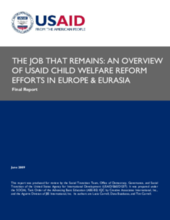The Job That Remains: An Overview of Child Welfare Reform Efforts in Europe & Eurasia examined the eight countries in which USAID supported significant child welfare reform programs: Armenia, Azerbaijan, Belarus, Bosnia-Herzegovina, Georgia, Romania, Russia, and Ukraine. The paper discusses population issues, the current system of child welfare, USAID-funded activities, lessons learned, and best practices.
Significant economic, democratic, and social reforms have changed the face of the region. But one legacy of the communist system – children in institutions – persists despite expectations that economic restructuring and democratic reforms would solve this and other social issues. While important steps have been made to shift child protection from institutional care to community based services, the reforms are fragile and the sustainability of investment to date is questionable.
The findings of the report are that each of the eight countries has made substantial gains in reforming the child welfare system. The eight countries have developed models, formed partnerships, trained human resources, and passed legislation. But in most of the countries, the new methods have not had the time to become fully integrated into the countries’ systems nor have they been rolled out to enough of the country to ensure that the reforms will be carried out on a national basis.
The study yields conclusions that are worrisome for the wellbeing of children, but also for the democratic and economic stability of the region. Residential institutions, which are more expensive than community-based care and have been proven to be detrimental to children’s development, are still viewed as acceptable; and in fact, the number of institutionalized children has increased in seven of the eight countries since 2000. The paper concludes with a strong list of reasons why USAID and others should continue to invest in child welfare reform in the E&E region.

